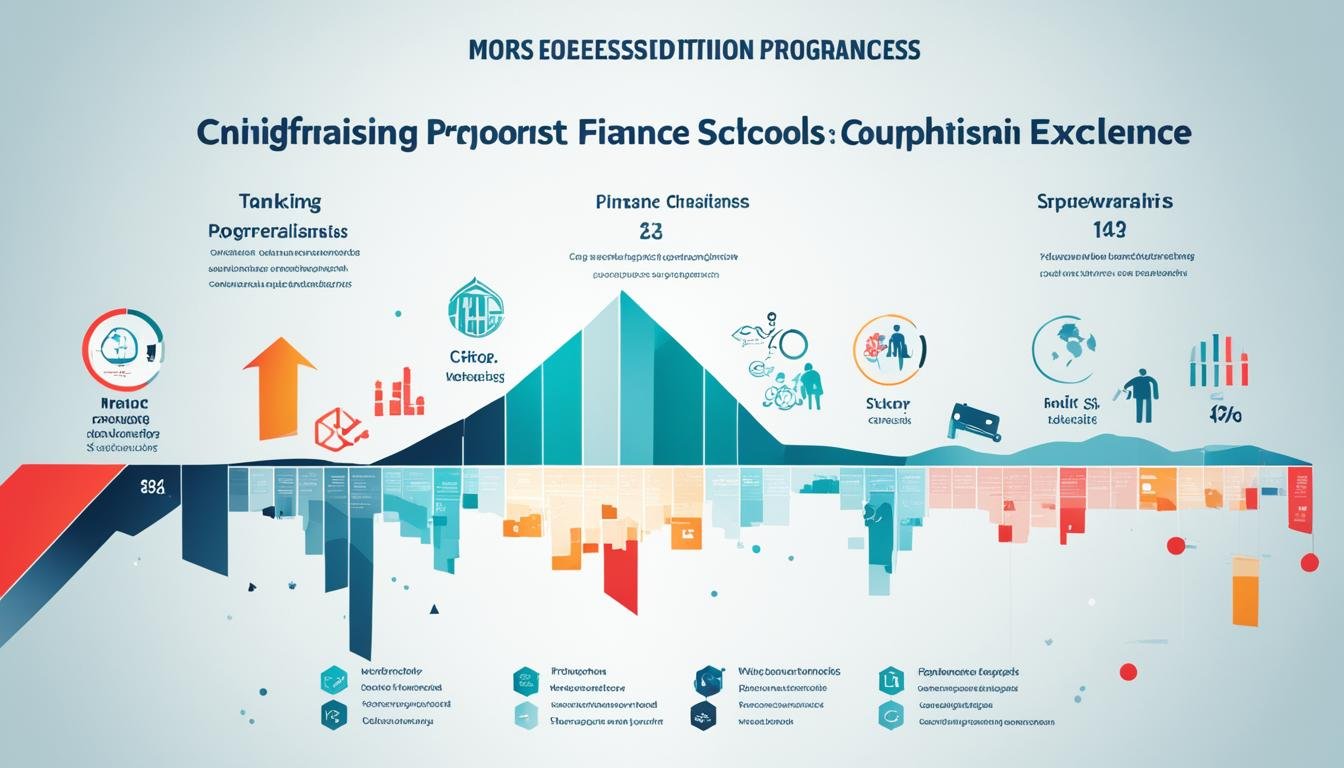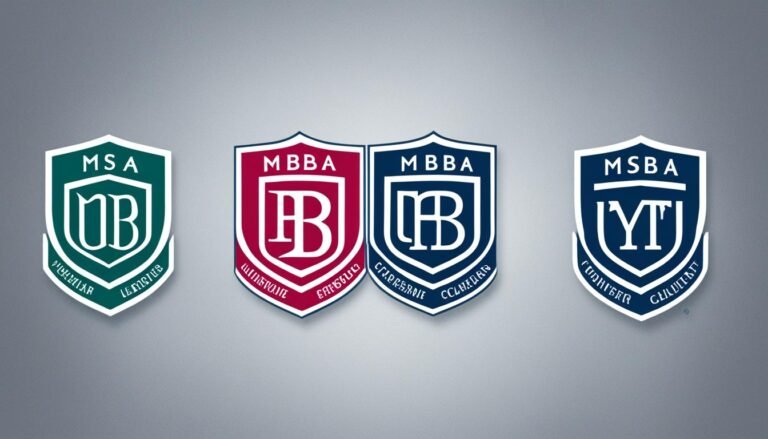Best Master of Science in Finance (MSF) Degrees
Did you know that job opportunities for financial managers will increase by 16%? Financial analysts will also see an 8% rise in job openings up to 2032. These roles come with yearly salaries of $139,000 and $96,000, respectively. Getting a Master of Science in Finance (MSF) degree could really boost your career.
By pursuing an advanced degree in finance, you can improve your job prospects. It can lead to better-paying positions. This is true whether you’ve just finished school or you’re aiming to move up in your career. Picking the right MSF program is key to your success.
Key Takeaways:
- Pursuing a Master of Science in Finance (MSF) degree can lead to significant career opportunities with higher salaries.
- Researching and choosing the best MSF program that aligns with your career goals is essential.
- Consider factors such as curriculum, internships, specializations, and financial aid when selecting a program.
- Alternative options, such as specialized finance programs and online learning, may provide flexible and convenient options.
- With dedication and the right program, you can position yourself for success in the finance industry.
How to Choose a Master’s in Finance Degree Program
Finance master’s degrees in different schools might share a final goal, but each stands out. When you look at them, think about what you want, who you are, and your budget. It’s crucial that where you go is well respected in business too.
Deciding on a finance master’s is big and can influence your financial career. You should pick a program that matches your work goals, and will help you learn needed finance skills. Here are key things to remember when picking:
1. Program Curriculum
The courses in your master’s finance program are important. Make sure they focus on finance areas you are keen on and relate to your job goals. Programs should teach you about finance analysis, managing investments, handling risks, and creating finance models.
2. Reputation and Accreditation
It’s smart to choose your master’s program from a school with a good name. Programs with recognized quality from groups like AACSB or ACBSP show they meet high standards. This gives you more confidence in their education level.
3. Faculty and Resources
Look into the finance department’s professors at your chosen school. Pick teachers who know their stuff and have real-world finance experience. Also, see what student resources are available. These might include databases, research centers, and help with finding jobs. These extras can make your education better and help you meet people in the industry.
4. Internship and Networking Opportunities
Internships are key for getting real work experience and making industry connections. Check if your school offers chances to intern at big finance places. Also, see what alumni networks and networking events the school has. A good network can lead to job offers and advice from others who have been in your shoes.
5. Location and Lifestyle
Think about where the school is and if it fits with your life. Some people might like being in a busy financial city, while others prefer something quieter. Look at living costs, housing, and job prospects in the area too.
It’s best to visit different finance schools and do your homework. This way, you can make a smart choice and find a finance master’s program that meets your dreams.
Quotes
“Selecting the right master’s in finance degree program is crucial. It can majorly affect your finance career. Think about your goals, the courses, and the program’s standing to match your dreams.”
– John Smith, Finance Expert
Top 5 Master’s in Finance Degree Programs
| School | Program | Cost per Credit |
|---|---|---|
| Massachusetts Institute of Technology | Master of Finance | $1,327-$1,824 |
| University of Texas at Austin | Master of Finance | $1,625-$1,791 |
| Texas A&M University Mays Business School | Master of Science in Finance | $868-$1,410 |
| Columbia University | Master of Finance | $1,456 |
| Indiana University-Bloomington | Master of Finance | $739-$1,406 |
Researching Schools and Programs
Thinking about getting a Master of Science in Finance degree? It’s vital to look into different schools and programs. This helps find what fits your goals best. Some important things to think about are listed below.
Evaluating Finance Schools
- Academic Reputation: Find schools known for their strong finance education. Their reputation shows what they offer is quality.
- Accreditation: Make sure the schools you like are accredited. This means they meet high standards of education and learning.
- Culture and Learning Environment: Every school has its own vibe and way of teaching. It’s good to know if it matches what you’re looking for.
- Contacting Former Students: Talking to past students can give you a real insight. They can tell you how well the program prepared them for their careers.
Evaluating Finance Program Curriculum
Programs’ courses are key and shape your finance knowledge and skills. Here’s what to look into:
- Course Offerings: Check out the courses. Make sure they help you reach your career goals. They should include key finance topics like investment analysis and corporate finance.
- Faculty: Learn about the teachers’ qualifications. Professors who know their stuff can be a big help during your studies.
- Class Size and Classroom Settings: Think about what class sizes you like. Small classes may be better for some, while others like big ones with many different views.
- Remote and In-Person Offerings: If you like learning online, it’s important to see if that’s an option with the program you’re considering.
Exploring Internships and Projects
Getting hands-on experience through internships and projects is great in finance. Here’s what to consider:
- Internship Programs: See if the school helps set up internships. Good industry connections are a plus.
- Project-Based Learning: Programs with real-world projects let you use what you’ve learned in a practical way. This is great for developing key skills.
- Completion Time: Think about how long the program takes, including any internship or project times. Consider your schedule and what you can commit to.
Doing your homework on finance schools and programs is key. It ensures you pick the right one for your career dreams and how you like to learn.
| School | Average Expenditure |
|---|---|
| Massachusetts Institute of Technology | $1,327-$1,824 per credit |
| University of Texas at Austin | $1,625-$1,791 per credit |
Preparing for Tests and Applications
Thinking about a master’s in finance degree program means knowing what you need to get in. Schools set criteria you must meet. This includes having good references, high test scores, and keeping a good GPA.
If your background isn’t in finance, you might need extra classes first. These classes will give you the needed info. This way, you’ll be ready for what your program will throw at you.
After confirming you meet all the must-haves, it’s time to get your application ready. You’ll need your past education transcripts, some good references, and a standout personal statement. Don’t forget the deadlines and allow enough time for preparing everything.
You’ll often have to pay application fees. These fees help cover the costs of processing applications. You should expect to pay them as part of the process.
Getting your application in early is smart, especially for getting scholarships. Scholarships can help pay for your finance degree. By applying before most others, you better your chance of getting financial help.
Key Points:
- Ensure you meet the finance program prerequisites and eligibility requirements.
- Consider taking additional classes if your background is unrelated to finance.
- Gather your transcripts, letters of recommendation, and personal statement.
- Be aware of application fees and submission deadlines.
- Submit your application early for a better chance of receiving scholarships.
Selecting Your Program
Choosing between a Master of Science in Finance (MSF) or a Master of Business Administration (MBA) in Finance is a big step. You must select the best one for your career aims. Think about what you want to achieve.
Some finance programs let you do internships. These give you real-world experience. But if you already have a job or experience, you might not need an internship.
Look at the elective courses each program offers. Electives help you focus on what you really want to learn. Choosing courses like business analytics or investment banking can boost your job opportunities.
| Program | Internship Option | Elective Courses |
|---|---|---|
| Program A | Yes | Business Analytics, Investment Banking |
| Program B | No | Marketing, Management |
| Program C | Yes | Investment Banking |
When picking a program, think about what you want to do in your career. Do your research. Make sure the program you choose will help you grow professionally over time.
Expert Insight
“Choosing a program means thinking about your career goals and what each program offers. Specializations and electives are key to your education and future career.”
– Jane Smith, Finance Professor
Financing Your Degree
Education can feel like a treasure, but it does have a price tag. When thinking about your degree, remember it’s not just tuition. There are books, materials, and time spent studying instead of working. Make sure you know all the costs.
Thankfully, there are many ways to get help paying for your education. Schools offer scholarships, loans, and work programs. Scholarships are awarded based on achievements or certain criteria. Loans help cover costs and can come from banks or federal agencies.
Your job might also help with tuition. Many employers offer to pay or help pay for education that benefits them. This can make a big difference in how you pay for your degree. Check with your company to see what they offer.
“Education is the most powerful weapon which you can use to change the world.” – Nelson Mandela
Building a financial plan for your degree means thinking about more than just tuition. Factor in costs like less time working, more study materials, or even childcare. Including these in your budget ensures you won’t be sidetracked by money worries.
Financial Aid Options for Finance Programs
There are several paths to getting help with the cost of your education. Here are a few:
- Look for scholarships that fit your finance program from schools, organizations, or private groups.
- Fill out the FAFSA for federal loans to see if you qualify.
- Ask your job about help with tuition, or if they’re offering scholarships.
- Consider working part-time at your school for financial aid and experience through work-study or assistantships.
Exploring these options and making a solid financial plan will make financing your degree easier. It allows you to focus on your studies, not the costs.
| Financial Aid Option | Description |
|---|---|
| Scholarships | Merit-based or need-based financial assistance awarded by universities, professional organizations, and private agencies. |
| Loans | Borrowed funds designed for educational expenses, typically offered by banks or federal programs. |
| Tuition Reimbursement | Financial support provided by employers for employees pursuing higher education, usually with the requirement to remain with the company for a specified period. |
| Work-Study | Part-time employment opportunities within the university or college that provide financial aid in exchange for work. |
Top 50 Accredited Master’s in Finance Degree Programs
Finding the right Master’s in Finance program is very important. We’ve created a list of the top 50 accredited programs. These programs are known for their quality education and expert faculty.
1. Massachusetts Institute of Technology
| Average Expenditure | $1,327-$1,824 per credit |
|---|
2. University of Texas at Austin
| Average Expenditure | $1,625-$1,791 per credit |
|---|
3. Texas A&M University Mays Business School
| Average Expenditure | $868-$1,410 per credit |
|---|
4. Columbia University
| Average Expenditure | $1,456 per credit |
|---|
5. Indiana University-Bloomington
| Average Expenditure | $739-$1,406 per credit |
|---|
6. University of Southern California
| Average Expenditure | $2,307 per credit |
|---|
7. University of Texas at Dallas
| Average Expenditure | $1,111-$1,611 per credit |
|---|
8. University of Wisconsin – Madison
| Average Expenditure | $1,000 per credit |
|---|
These programs provide various opportunities to improve your finance skills. You can choose programs emphasizing different areas in finance. This includes quantitative finance or financial analysis and management.
Remember, all these programs have accreditation. This means you can trust the quality of education they offer. Accreditation shows the programs meet high standards.
Choosing a Master’s in Finance program involves more than just looking at cost. Think about the program’s reputation and the chances it offers for internships. This will influence your education and future job opportunities.
Opting for a top-rated program can help you succeed in finance. A degree from one of these programs will prepare you for jobs like financial analyst or investment manager.
Alternative Options for Pursuing a Master’s in Finance
Getting a master’s in finance lets you choose from various options. There are programs that mix classroom learning with online courses. You can pick the one that fits your career dreams and what you like.
Villanova University has a great program in finance. It sharpens your skills in company finance, money management, and data analysis. This can make you more competitive in finance jobs.
Creighton University is also known for its finance programs. Their online option teaches you about managing investments and studying money trends. It’s perfect for those in investment and finance analysis who want to grow.
The University of Rochester offers an online finance master’s, too. It focuses on company finance, dealing with investments, or handling risks. This wide program gets you ready for different finance jobs in many fields.
These different finance master’s programs give you the chance to shine in a tough job market. They’re tailored for success, whether you want to learn online or focus on a special area. With these, you can learn what you need and stand out in finance.
| University | Program | Specialization | Tuition Range |
|---|---|---|---|
| Villanova University | Master’s in Finance | Corporate Finance, Investment Management, Analytics | $XX,XXX – $XX,XXX |
| Creighton University | Master of Investment Management and Financial Analysis | Investment Management, Financial Analysis | $XX,XXX – $XX,XXX |
| University of Rochester | Master’s in Finance | Corporate Finance, Investments, Risk Management | $XX,XXX – $XX,XXX |
Conclusion
Earning a Master of Science in Finance can boost your job options and salary. It prepares you for success in the financial field’s evolution. But, finding the ideal program is key to reaching your career targets.
Choose a master’s in Finance program that matches your goals carefully. Look for top-notch courses that give you essential skills and knowledge. Also, look for programs that include internships and specializations. These will boost your job readiness and appeal to employers.
Figuring out how to afford your degree is also vital. Explore financial aid and scholarships to lower your costs. By selecting the right program and staying committed, you can excel in finance. This way, you can make the most of the great prospects a Finance Master’s degree offers.








